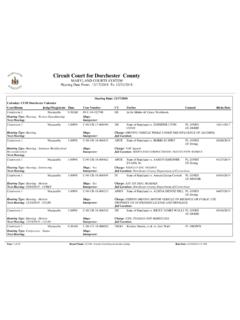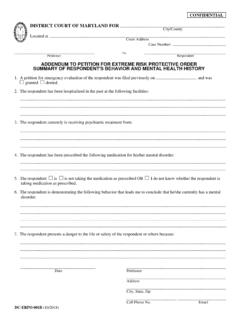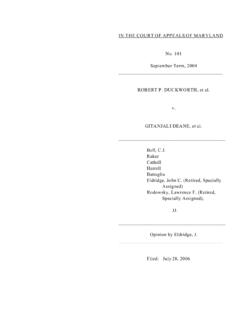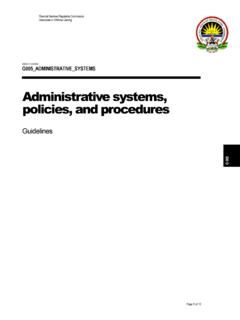Transcription of MDEC Policies and Procedures - mdcourts.gov
1 MDEC. Policies & Procedures Table of Contents Introduction to this Manual .. 1. What is MDEC?.. 1. MDEC has Three Component Parts .. 1. MDEC Functionality and 1. Purpose of This Manual .. 2. Registration Rule 20-104 .. 3. Registered Users Generally .. 3. Individual User Registration .. 4. Registering the Firm .. 8. Managing the Firm Account (Firm Administrator).. 11. Firm Administrator's Continuing Duties .. 14. Firm User Registration .. 14. Who Must E-File .. 17. What Must Be E-filed .. 17. Attorney Appearance .. 18. Electronic Filing-General Requirements and 19. General Requirements.
2 19. E-Filing Process .. 20. New Case Initiation .. 20. Uploading PDFs .. 25. Attach a Lead 25. Include Multiple Documents in a Single 26. Redacting and Un-redacting Documents .. 27. File into Existing Case .. 29. Templates Foreclosure .. 30. Example: Foreclosure Cases .. 30. Optional Services .. 31. Example: Requesting Sheriff/Constable or Certified Mail Service in District Court .. 31. Proposed Orders .. 32. Original Documents .. 32. Filing Exhibits for Remote Hearings via File and Serve .. 33. Omnibus Motions Not Allowed .. 34. Pre-payment Waiver .. 34. Review by Clerk - Correction, Deficiencies and Striking - Rule 20-203.
3 35. Signatures .. 35. Electronic Service .. 36. Overview .. 36. Steps to Electronically Serve a Submission .. 36. Serving the State's Attorney's Office .. 39. Discovery Material .. 39. Appendix .. 44. i administrative Office of the Courts MDEC Policies & Procedures Introduction to this Manual What is MDEC? MDEC stands for Maryland Electronic Courts. MDEC's goal is to create a judiciary-wide integrated case management system that will enable courts at all levels to collect, store, process, and access records electronically. Attorneys and parties may file and access records electronically.
4 The system produces paper-on-demand. MDEC has Three Component Parts 1. Odyssey File and Serve Operated by Tyler Technologies, it's the filing interface between the registered users and Odyssey. 2. Odyssey The Judiciary's case management system. 3. Maryland Judiciary Record Search Portal Allows attorneys of record and parties to have full access where not restricted by law or court order to cases in which they are involved. This includes document access. MDEC Functionality and Benefits 1. Convenience of 24/7 access. Registered users can send documents to and obtain information from the court from anywhere at any 2.
5 Increased efficiency in the areas of case initiation and indexing, docketing and recordkeeping, document generation and processing, in-court docketing, disposition, monitoring compliance, and case closing. 3. An Alternative Dispute Resolution (ADR) component to monitor resolution efforts occurring outside of the court. 4. A bond tracking component for tracking bonds posted statewide. 5. A scheduling component for setting, maintaining and displaying information about court- scheduled events, and for calendar maintenance. 6. Information exchanges with the Judiciary's justice partners.
6 1. Access to MDEC is governed by the provisions of Rule 20-109 and, for the general public, Title 16 Chapter 900. 1/18/2019. REVISED 10/1/2020 1. administrative Office of the Courts MDEC Policies & Procedures Purpose of This Manual This manual describes the requirements, protocols, and Procedures for using MDEC as set forth in Title 20 (Electronic Filing and Case Management) of the Maryland Rules. It is intended as a supplement and a guide to these Rules. It is published under the authority granted to the State Court Administrator by Maryland Rule 20-103(b)(1). Title 20 governs all MDEC actions.
7 MDEC users must be familiar with the Rules contained in Title 20. If you encounter an issue that you can't resolve by a careful reading of the Title 20. Rules or this Manual, you may: Consult the MDEC Frequently Asked Questions segment on the Judiciary Website ( );. Send your question to the Judiciary's IT Service Desk at Compliance with Title 20 is mandatory for MDEC users. Failure to comply can have serious consequences. Rule 20-203(a) requires the clerk to review a submission prior to docketing. If your submission materially violates a provision of the Rules in Title 20 or an applicable published policy or procedure established by the State Court Administrator, the clerk may issue a Deficiency Notice under Rule 20-203(d).
8 If your submission fails to comply with the requirements of Rule 20-107(a)(1) or Rule 20-201(g), the clerk must strike the submission and notify the filer and all other parties of the striking and the reason for it. See Rule 20-203(c). A. submission containing a confidential document will be rejected if the submission fails to comply with Rule Filings will be rejected if a submission does not relate to the case in which it was filed under Rule 20-203(a)(2). See File & Serve (OFS) Envelope Status for Filers. 1/18/2019. REVISED 10/1/2020 2. administrative Office of the Courts MDEC Policies & Procedures Registration Rule 20-104.
9 Registered Users Generally 1. To electronically file a submission, a filer must be a registered user. Only a person may become a registered user. Corporations and other business entities may not be registered users. 2. There are two basic types of registered users: a. Individual user an individual user is a non-attorney who only files for himself or herself and not on behalf of another person or entity. b. Firm user a firm user includes: i. All attorneys, whether or not they are associated with a firm;. ii. Persons authorized by an attorney to file on behalf of the attorney.
10 Iii. Persons authorized by law to file on behalf of another person or entity. All firm users must register with at least one firm administrator (See firm administrator registration). 3. There is no charge for registration. 4. When filing electronically in an official capacity, judicial personnel 2 need not be registered users. When filing electronically in an individual capacity, however, judicial personnel must register with a private email address. 5. To be a registered user, a person must: a. Maintain a current email address for electronic notice and service. b. Meet certain minimum equipment requirements.












